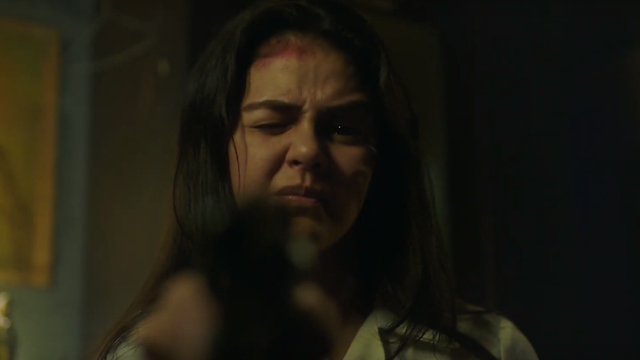(Reviews for QCinema International Film Festival 2019. Browse here for the full coverage)
The 7th QCinema International Film Festival opens with Sigrid Bernardo’s “Untrue.” It’s the “Ang Huling Cha-Cha ni Anita” director’s take on a he-said, she-said thriller, although she has memorably used the narrative device on the ending of her previous “Kita-Kita.”
 |
| Sigrid Bernardo's "Untrue" |
In this film, a couple (played by Cristine Reyes and Xian Lim) narrates the eventual lost of each other’s sanity in two separate confessions, and how it transforms their relationship into an abusive one. As to which of the two confesses honestly from the two different variations of the same events remains the mystery of the movie.
Told in non-linear fashion, “Untrue” is one of those movies that could still benefit, if not improve on, with a more straightforward structure. There’s an interesting story to unfold here, but it lost me on how its mystery paid off.
I was surprised to see Lim and Reyes display multiple beats of emotion here, as their characters demand so. I personally think they are their best here.
 |
| Glenn Barit's "Cleaners" |
Three Filipino films are funded by QCinema to compete with other Asian filmmakers on their Asian Next Wave category. My favorite from the PH bunch is “Cleaners” by Glenn Barit.
I have always adored Barit for his technical innovation to tell compelling humane stories since his short films (Nangungupahan, Aliens Ata), although I do feel his decision to make his meticulously produced debut feature far seems too ambitious.
In “Cleaners,” Barit and his team printed every frame of the film, photocopied everything, colored some elements using highlighter pens, crumpled the papers, scanned, and finally, edited on the computer.
Barit explained that this move was a result of his wanting to make the film feel more like a memory, which in fact, did. I have never seen anything like “Cleaners.” The eventual effect feels like looking at recovered home videotape footage.
Its nostalgia is very present up to its story, an anthology of teenagers’ wacky antics and personal struggles as a high schooler. Barit did not let his incorporation of nostalgia feel too pushy, but as earnest as possible.
Although Barit clearly wants authenticity out of his set of stories here, “Cleaners” works best when its technical “gimmick” suddenly becomes a part of its story, as if they are wallflowers clamoring for the loudest shout. It’s a short magical bit that made the entire thing bloom even more. It might’ve been one of my favorite scenes this year.
 |
| Arbi Barbarona's "Kaaway sa Sulod" |
Arbi Barbarona’s “Kaaway sa Sulod” opens with a montage that feels random. And even when its actual plot went on, I still find myself feeling lost in its world.
There’s an interesting story here. A rebel-in-disguise (Dionne Monsanto) tries to assassinate a general in a mission-gone-wrong. To her surprise, she encounters a woman from the opposing team who looks exactly like her.
As much as I wanted to invest even more in this movie, the central relationships between its characters weren’t compelling enough and scenes operate longer than it should.
There’s a great movie underneath this. A part of me wants to see this film edited tighter and allow its presentation of ideals more intact and snappier than just lengthy monologues.
 |
| Rae Red's "Babae at Baril" |
Rae Red’s “Babae at Baril” follows a woman (Janine Guttierez) who stumbled upon a gun. Unsure of what to do with it, one violent evening convinces her of the possibilities and opportunities it could entail.
The movie displays a striking message on the multiple forms of violence in our society, all represented through the history of the gun, literally following it from its creation to the point our lead character attempts to make her big pull from the trigger.
“Babae at Baril” shines the best when it lingers for a while, allowing us to go deeper to the psychology of a person finding the opportunity for power through the central gun. Ironically, it stumbled down when it attempts to overexplain its thesis through interconnected moments.
However, it managed to redeem itself and ended on a powerful note. “Babae at Baril” could’ve improved on by trimming a few sequences in between, but still, a great directorial effort for Red. Excited to know what she will do next.












Comments
Post a Comment